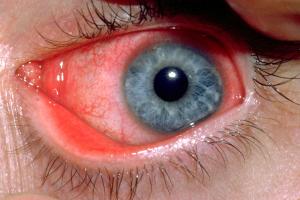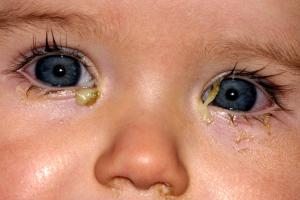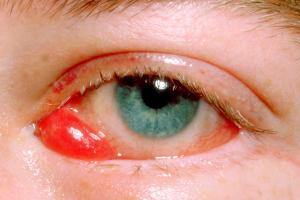Conjunctivitis
Conjunctivitis causes redness and inflammation of the thin layer of tissue that covers the front of the eye. It is a common condition. People often refer to conjunctivitis as red eye.
Causes of conjunctivitis
The thin layer of tissue that covers the front of the eye is called the conjunctiva.
Common causes of inflammation of the conjunctiva include:
- a bacterial or viral infection – known as infective conjunctivitis
- an allergic reaction to a substance such as pollen or dust mites – known as allergic conjunctivitis
- the eye coming into contact with things that can irritate the conjunctiva, such as shampoo or chlorinated water, or a loose eyelash rubbing against the eye – known as irritant conjunctivitis
Symptoms of conjunctivitis
The symptoms of conjunctivitis will depend on what's causing the condition.
The two main symptoms are usually:
- eye redness – as a result of the inflammation and widening of the tiny blood vessels in the conjunctiva (the thin layer of cells covering the front of the eyes)
- a discharge – the conjunctiva contains thousands of cells that produce mucus and tiny glands that produce tears – inflammation causes the glands to become overactive, so that they produce more water and mucus


In bacterial infection, only one eye may be affected at first, but symptoms can affect both eyes.
Other forms of conjunctivitis may affect both eyes at the same time.
Infective conjunctivitis
If you have infective conjunctivitis, you may also have:
- a burning sensation in your eyes
- a feeling of grit in your eyes
- a sticky coating on the eyelashes – usually when you first wake up in the morning
- an enlarged lymph node (gland) in front of the ear
Allergic conjunctivitis
You may have itchy eyes if you have allergic conjunctivitis. You may also develop swelling (oedema) of the conjunctiva, known as chemosis.
Chemosis is a general sign of eye irritation. The outer surface covering appears to have fluid in it. The conjunctiva becomes swollen and may be gelatinous in appearance.

The pattern of symptoms for allergic conjunctivitis depends on the substance you're allergic to.
Allergies to pollen (hay fever) occur during certain parts of the year.
Some people develop an allergy to eye drops. It can also affect your eyelids, causing them to become dry and sore.
Some people are allergic to wearing contact lenses. The symptoms progress much more slowly. You may also develop small spots on the inside of your upper eyelids.
This type of conjunctivitis carries a high risk of complications. You need to seek medical advice as soon as possible.
When to seek medical advice
Most cases of conjunctivitis aren't a cause for concern.
However, you should contact your GP if you think you have conjunctivitis.
Your GP can check whether there's a more serious underlying cause of your symptoms.
When to seek immediate medical advice
The following symptoms could be the sign of a more serious eye condition:
- pain in your eyes
- sensitivity to light (photophobia)
- disturbed vision
- intense redness in one eye or both eyes
Contact your GP, or GP out of hours service immediately if you experience any of these symptoms.
If this isn't possible, visit your nearest emergency department.
Treating conjunctivitis
Treatment isn't usually needed for conjunctivitis.
Symptoms of conjunctivitis often clear up within a couple of weeks.
If treatment is needed, the type of treatment will depend on the cause.
In severe cases, antibiotic eye drops can be used to clear the infection.
Irritant conjunctivitis will clear up as soon as whatever is causing it is removed.
Allergic conjunctivitis can usually be treated with anti-allergy medications, such as antihistamines.
Speak to a pharmacist about conjunctivitis. They can give you advice and suggest eyedrops or antihistamines to help with your symptoms.
If possible, you should avoid the substance that triggered the allergy.
It's best not to wear contact lenses until the symptoms have cleared up.
Any sticky or crusty coating on the eyelids or lashes can be cleansed with cotton wool and water.
Washing your hands regularly and not sharing pillows or towels will help prevent it spreading.
Work and school
The Public Health Agency advises you don't need to stay away from work or school if you or your child has conjunctivitis, unless you (or they) are feeling particularly unwell.
If there are a number of conjunctivitis cases at your child's school or nursery, they may advise the school or nursery if any precautions are necessary.
Complications
Conjunctivitis can be a frustrating condition, particularly allergic conjunctivitis.
In most cases it doesn't pose a serious threat to health.
Complications of conjunctivitis are rare. However, a severe case of allergic conjunctivitis can lead to scarring in the eye.
In cases of infective conjunctivitis, the infection can spread to other areas of the body, triggering more serious secondary infections, such as meningitis.
Neonatal conjunctivitis
Neonatal conjunctivitis is a type of conjunctivitis that can affect newborn babies less than 28 days old.
Most cases of neonatal conjunctivitis aren't particularly serious.
A few cases occur if a baby is born to a mother who has a sexually transmitted infection (STI), such as chlamydia or gonorrhoea.
These infections don't necessarily cause symptoms in the mother, so many of them are unaware they're infected.
With STIs, there's a possibility of serious complications if the infection is left untreated.
Contact your GP if you notice any redness in your baby’s eyes.
More useful links
The information on this page has been adapted from original content from the NHS website.
For further information see terms and conditions.